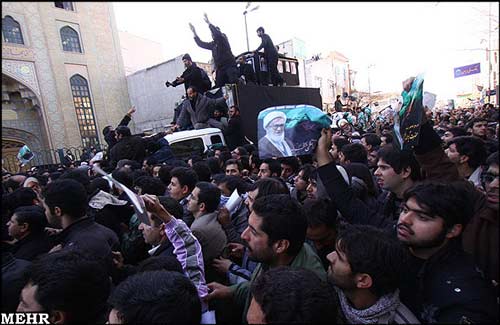The death of Grand Ayatollah Hossein-Ali Montazeri in Iran has caused huge public grief and anger:
Blogger Cyrus Farivar reminds us of the man’s influence on Iran’s internet culture:
I’m obviously fascinated with Montazeri’s small role in Iran’s Internet history. As best as I can tell, this is the first example of the Islamic Republic’s getting involved in the Internet directly and going after a particular person directly, even through cybersquatting.
Back in 2000, the Agence France Presse covered this interesting episode.
Montazeri.com vs. Montazery.com: Ayatollahs wage war on Internet
Friday 15 December 2000 – Agence France Presse PARIS, Dec 15 (AFP) – Dissident cleric Hossein Ali Montazeri, once in line to be Iran’s supreme leader, this week dropped a political bombshell by publishing his memoirs onthe Internet and provoking a cyber war with the
leadership in Tehran.Montazeri, 79, who had been chosen to succeed Ayatollah Ruhollah Khomeini, founder of the Islamic republic, has been living under house arrest in Qom, south of Tehran, ever since he was forced to resign weeks before Khomeini’s death in 1989.
A fierce opponent of Iran’s current supreme spiritual leader, Ayatollah Ali Khamenei, Montazeri in recent years has from time to time managed to make his opinion known through his sons.
But he struck a hard blow on Monday when he published a 600-page memoir on an Internet site based in Britain, which his sons verified as his work.
The document, published in Persian and available at www.montazeri.com, provides important testimony to some of the most dramatic moments of the revolution and the war with Iraq.
Authorities in Tehran have so far not publicly reacted to Montazeri’s memoirs but on Thursday a counter-site — www.montazery.com — appeared on the internet and described itself as representing the office of Khamenei.
Most noteworthy on the first site are Montazeri’s remarks on how he tried in 1988 to prevent the summary execution of thousands of opponents to the Khomeini regime.
He states that Khomeini ordered the executions after the opposition launched a fierce offensive against Iranian troops from bases in Iraq.
“All those against the revolution must disappear and quickly be executed,” the cleric quotes Khomeini as saying in a written note.
Montazeri said he decided to intervene to prevent the killing of 2,800 to 3,800 men by writing a letter to Khomeini in which he appealed for compassion.
“I told myself ”˜I am after all the Imam’s successor and I took part in this revolution’,” he says in his memoirs. “If an innocent man is killed, I am also responsible.”

